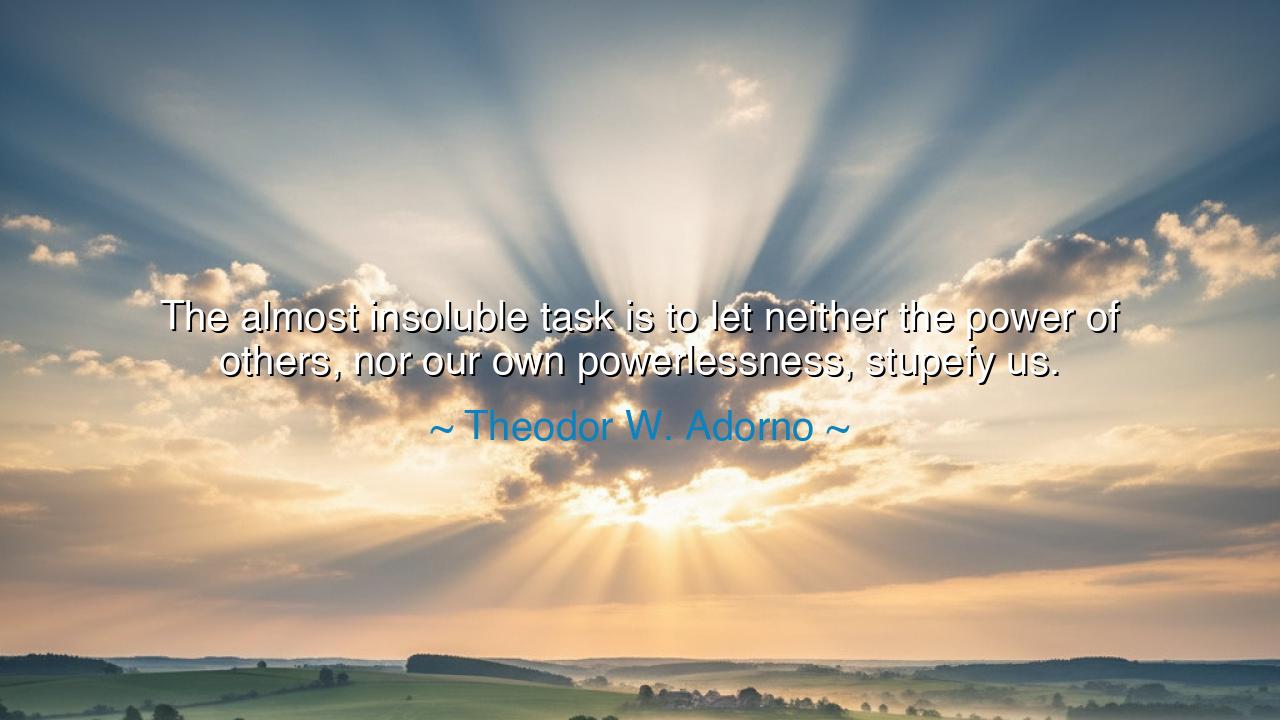
The almost insoluble task is to let neither the power of others
The almost insoluble task is to let neither the power of others, nor our own powerlessness, stupefy us.






The philosopher Theodor W. Adorno, born amidst the upheavals of the twentieth century, once proclaimed: “The almost insoluble task is to let neither the power of others, nor our own powerlessness, stupefy us.” These words rise like a stern warning against despair and submission. For man stands ever between two dangers: the crushing weight of power wielded by others, and the numbing sense of his own powerlessness. To surrender to either is to fall into a slumber of the spirit, a forgetting of dignity, a silence where courage should speak.
Adorno had seen the world consumed by tyrants, the machinery of fascism grinding nations into dust. He knew well how the power of others can appear so vast that resistance seems foolish, even impossible. Yet he also knew that the greatest chains are not of iron, but of the mind—when men are stupefied, made passive by fear, by hopelessness, by the lie that nothing can be done. The insoluble task, then, is to awaken, to remain vigilant, to preserve thought and conscience even in the shadow of might.
Consider the story of Sophie Scholl and the White Rose resistance in Nazi Germany. She and her companions were but students, armed not with weapons, but with words—leaflets calling for freedom and truth. Against the vastness of the Reich, their powerlessness seemed absolute. Yet they did not let it stupefy them. They acted, knowing the cost. Sophie was executed at twenty-one, but her voice still echoes across history, proving that even the smallest flame can resist the night.
Adorno’s teaching is therefore a call to balance. To cower before the power of others is to lose one’s freedom; to sink into despair at one’s own weakness is to lose one’s will. But to remain steadfast, neither dazzled by the strong nor paralyzed by one’s limits, is to keep the soul awake. This vigilance is difficult—indeed, almost insoluble—but it is the very essence of human dignity.
Let the generations remember: tyranny thrives not only on the strength of rulers, but on the sleep of the people. And so, awaken! Do not let the power of others blind you, nor let your own frailty chain you. For within each heart lies a spark, and even in the face of overwhelming might, that spark—kept alive—can one day set the world aflame with justice.






HMDo Ha My
There’s a profound emotional weight here. Adorno seems to be acknowledging how exhausting it is to stay awake to injustice without giving in to hopelessness. I wonder if he’s describing the essential struggle of being human in a flawed world—to neither idolize power nor internalize defeat. Is true wisdom found in that tension, in refusing to let either force define our consciousness?
HMPhan Nguyen Ha My
This quote feels like a quiet cry for intellectual vigilance. I think Adorno was pointing to how easily society becomes desensitized—people either glorify those in power or drown in their own helplessness. It’s a tension that still defines politics and media today. How do we cultivate awareness without succumbing to despair? Maybe the key lies in small acts of clarity, persistence, and refusal to be numbed.
GBLe Gia Bao
I interpret this as a warning against two forms of paralysis—one from external domination, and one from internal resignation. Both can make us passive observers rather than active participants. But it raises a hard question: how can individuals maintain critical thought when institutions are designed to suppress it? Perhaps it requires a kind of moral courage that resists both fear and indifference.
BTBao Thy
This thought really strikes at the heart of modern society. It’s not just about political systems, but about personal psychology—how easily people surrender their agency. I can’t help but ask: is the real danger not power itself, but the apathy it breeds in others? Maybe Adorno is suggesting that freedom isn’t just about breaking chains, but about staying mentally and emotionally alert amid oppression.
VANgo Thi Van Anh
I find this statement hauntingly relevant today. With so much political and social chaos, it’s easy to feel powerless or to be blinded by those in control. Adorno’s challenge seems to be maintaining awareness without falling into cynicism. But how do you practically achieve that balance? Is it even possible to stay morally awake without burning out in a world that thrives on distraction and manipulation?